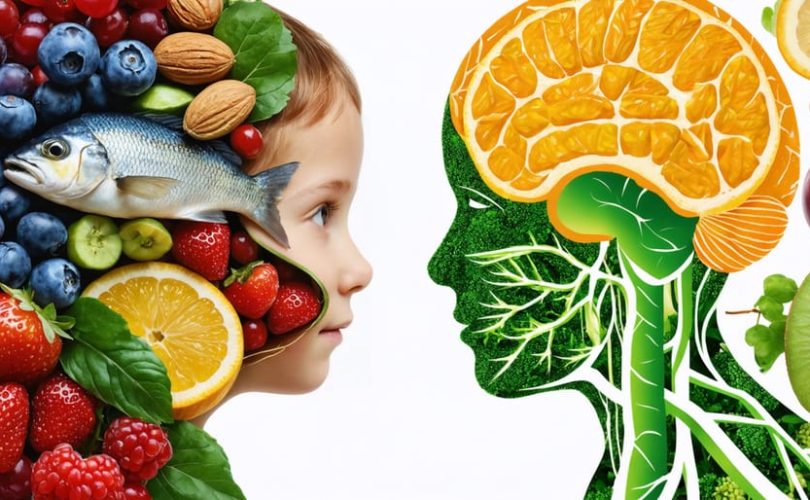Imagine discovering that your dinner plate could be as powerful as a prescription pad for mental health. Nutritional psychiatry, an emerging field of medicine, reveals how food choices shape your child’s brain and emotional well-being. This revolutionary approach combines traditional psychiatric care with evidence-based nutritional science, offering hope to families seeking natural ways to support mental health.
Just as a car needs the right fuel to run smoothly, our brains require specific nutrients to maintain emotional balance and cognitive function. Research shows that what we eat directly influences our mood, anxiety levels, and ability to focus – making the kitchen a powerful first line of defense in mental health care.
For parents concerned about their children’s emotional well-being, understanding nutritional psychiatry opens up new possibilities for support that go beyond traditional treatments. This gentle, whole-body approach acknowledges that mental health isn’t just about what happens in therapy sessions – it’s also about the thousands of small choices we make at our dining tables every day.
By bringing together the best of nutrition science and mental health care, nutritional psychiatry offers a promising path forward for families seeking comprehensive, natural approaches to emotional wellness.
What Is Nutritional Psychiatry?
The Science Behind Food and Mood
The food we eat does more than just fuel our bodies – it directly impacts our brain chemistry and mental well-being. When we consume different nutrients, they help create important brain chemicals called neurotransmitters, which influence everything from our mood to our ability to focus and stay calm.
For example, proteins contain amino acids that help produce serotonin, often called the “feel-good” chemical. Omega-3 fatty acids, found in foods like fish and nuts, support brain cell structure and communication. B vitamins play a crucial role in energy production and mood regulation, while zinc and magnesium help with stress management and emotional balance.
Think of your brain like a complex machine that needs the right fuel to run properly. Without essential nutrients, it’s like trying to run a car on empty – things just don’t work as well. This is especially important for children, whose brains are still developing and need proper nutrition to support healthy emotional and cognitive growth.
When we understand this connection between food and mood, we can make more informed choices about what we eat to support our mental health naturally.

The Gut-Brain Connection
Have you ever had “butterflies” in your stomach when feeling nervous? This common experience perfectly illustrates the powerful mind-body connection between our gut and brain. Scientists have discovered that our digestive system contains millions of neurons and produces many of the same chemicals found in our brain, including mood-regulating neurotransmitters like serotonin.
Think of your gut as a second brain that’s constantly communicating with your main brain through what scientists call the gut-brain axis. When your child has a healthy, balanced digestive system, it helps support positive mental health. On the flip side, digestive issues can influence mood, behavior, and overall emotional well-being.
This connection explains why children might experience stomach aches when anxious or why certain foods can affect their mood and energy levels. The good news is that by supporting your child’s gut health through proper nutrition, you’re also nurturing their mental health. A balanced diet rich in whole foods, fiber, and fermented foods can help maintain this delicate balance and promote both physical and emotional wellness.
Nutritional Psychiatry in Child Development
Critical Nutrients for Brain Development
Just as a house needs quality materials to build a strong foundation, our brains require specific nutrients for optimal development and function. Research continues to demonstrate the powerful connection between cognitive development and nutrition, highlighting several key nutrients that play crucial roles in brain health.
Omega-3 fatty acids, particularly DHA and EPA, are essential for brain cell communication and reducing inflammation. These healthy fats can be found in fatty fish, walnuts, and flaxseeds. Iron, another vital nutrient, helps carry oxygen to the brain and supports the production of neurotransmitters. Children who maintain healthy iron levels often show better attention spans and learning capabilities.
B-vitamins, especially folate and B12, support the production of feel-good chemicals in the brain and help maintain healthy nerve cells. Zinc and protein are crucial for creating new brain cells and supporting memory formation. Antioxidants, found in colorful fruits and vegetables, protect brain cells from damage and support overall cognitive function.
Dr. Sarah Thompson, a pediatric nutritionist, shares, “I’ve seen remarkable improvements in children’s mood and focus when their diets include these essential nutrients. It’s like giving their brains the tools they need to thrive.” Remember, these nutrients work best when consumed through a varied, balanced diet rather than relying solely on supplements.
Impact on Behavior and Learning
What children eat directly influences how they behave, learn, and develop. Parents often notice the immediate effects when their children consume sugary foods – the sudden burst of energy followed by irritability and difficulty concentrating. But nutrition’s impact on behavior and learning goes far beyond these short-term effects.
Research shows that children who regularly consume a balanced diet rich in essential nutrients demonstrate better focus, improved memory retention, and more stable moods throughout the day. For instance, omega-3 fatty acids, found in fish and certain nuts, support brain development and have been linked to better academic performance and reduced behavioral issues.
Sarah Thompson, a school counselor with 15 years of experience, shares, “I’ve observed dramatic improvements in students’ attention spans and classroom participation when their families make positive changes to their eating habits. Even small adjustments can make a big difference.”
Proper nutrition also plays a crucial role in managing conditions that affect learning, such as ADHD and anxiety. Children who eat regular, nutritious meals are better equipped to regulate their emotions and maintain consistent energy levels throughout the school day.
Meanwhile, nutritional deficiencies can lead to difficulties with concentration, increased aggression, and reduced problem-solving abilities. This is particularly concerning during critical periods of brain development, when proper nutrition is essential for building neural connections that support learning and behavior regulation.
Practical Applications for Parents
Brain-Boosting Food Choices
Making brain-healthy food choices doesn’t have to be complicated. Start by incorporating colorful fruits and vegetables into your family’s meals – blueberries, strawberries, and leafy greens are particularly beneficial for brain health. Omega-3 rich foods like salmon, sardines, and walnuts support cognitive function and emotional well-being.
Whole grains, such as quinoa, brown rice, and oats, provide steady energy throughout the day, helping to stabilize mood and concentration. Including protein sources like eggs, lean meats, legumes, and yogurt helps produce essential neurotransmitters that regulate mood and behavior.
Dr. Sarah Thompson, a pediatric nutritionist, shares: “I often recommend parents create a ‘rainbow plate’ at mealtimes. Not only does this ensure a variety of nutrients, but it also makes healthy eating fun for children.”
Some practical meal planning tips include:
– Prepare breakfast the night before with overnight oats topped with berries
– Pack lunch boxes with colorful vegetables and hummus
– Keep nuts and seeds handy for healthy snacking
– Include fatty fish in meals twice a week
– Choose dark chocolate as an occasional treat (it’s rich in mood-boosting compounds)
Remember to stay hydrated – even mild dehydration can affect mood and cognitive performance. Water should be the primary beverage, though herbal teas can be a soothing addition to your family’s routine.


Overcoming Picky Eating
Picky eating can be a significant challenge for parents, but it’s important to remember that it’s a common phase in child development. The key is to approach mealtimes with patience and creativity while maintaining a positive atmosphere. Instead of forcing children to eat, focus on making healthy foods more appealing and accessible.
Start by involving children in meal planning and preparation. When kids help choose vegetables at the grocery store or assist in cooking, they’re more likely to try new foods. Make meals fun by creating colorful plates or giving foods playful names – “dinosaur trees” for broccoli can spark interest in even the most reluctant eaters.
Consider the “one bite rule” – encourage children to try just one bite of new foods without pressure to finish. Praise their willingness to experiment rather than focusing on whether they liked it. Remember that it can take 10-15 exposures to a new food before a child accepts it.
Lead by example by maintaining your own healthy eating habits. Children often mirror their parents’ behaviors, so demonstrating enjoyment of nutritious foods can be powerful. Keep offering varied options without making separate meals, and avoid using food as a reward or punishment.
If picky eating persists or affects your child’s growth or development, consult with a pediatrician or registered dietitian. They can provide personalized strategies and ensure your child’s nutritional needs are being met while working through this phase.
Working with Healthcare Providers
Working with healthcare providers in nutritional psychiatry involves creating a collaborative team to support your child’s mental health journey. Your primary care physician, mental health professionals, and registered dietitians all play essential roles in supporting mental well-being through nutrition.
Start by discussing your interest in nutritional psychiatry with your child’s pediatrician or family doctor. They can provide initial guidance and refer you to appropriate specialists. When meeting with mental health professionals, share your interest in incorporating dietary approaches alongside traditional treatments. Many psychiatrists and psychologists are increasingly open to integrative approaches that combine conventional therapy with nutritional strategies.
A registered dietitian with experience in mental health can be particularly valuable. They can:
– Assess your child’s current eating patterns
– Identify potential nutritional deficiencies
– Create personalized meal plans
– Offer practical strategies for picky eaters
– Monitor progress and adjust recommendations
Remember to maintain open communication between all healthcare providers involved in your child’s care. Keep a food and mood diary to share during appointments, noting any changes in behavior or symptoms related to dietary modifications. This information helps providers make informed decisions about treatment plans.
Dr. Sarah Thompson, a pediatric nutritional psychiatrist, shares: “Parents often tell me they feel overwhelmed coordinating between different healthcare providers. I encourage them to think of themselves as the team captain – you know your child best and can help ensure everyone works together effectively.”
Be prepared to advocate for your child’s needs while remaining patient with the process. Some providers may be less familiar with nutritional psychiatry, so consider bringing educational materials or research to appointments. Most importantly, focus on finding professionals who listen to your concerns and are willing to work collaboratively toward your child’s wellness goals.
Nutritional psychiatry offers a powerful and accessible way to support mental health through mindful food choices and eating habits. As we’ve explored throughout this article, the connection between what we eat and how we feel isn’t just anecdotal – it’s backed by growing scientific evidence that shows our diet directly influences our mental well-being.
Remember, small changes can make a significant difference. Start by incorporating more whole foods, fresh fruits and vegetables, lean proteins, and healthy fats into your daily meals. Reduce processed foods and excessive sugar intake gradually, making sustainable changes that work for you and your family.
Pay attention to how different foods affect your mood and energy levels. Keep a food diary if it helps, and don’t hesitate to involve your children in conversations about healthy eating and its impact on how they feel. Making these changes as a family can create lasting positive habits and open discussions about mental health.
If you’re struggling with mental health concerns, consider discussing nutritional strategies with your healthcare provider. They can help you develop a personalized approach that combines traditional treatment methods with dietary improvements. Remember, nutritional psychiatry isn’t about replacing conventional mental health treatments but rather enhancing overall well-being through better nutrition.
Your journey to better mental health through nutrition is unique, and it’s okay to progress at your own pace. Every positive choice you make for your diet is a step toward better mental health for you and your family.



